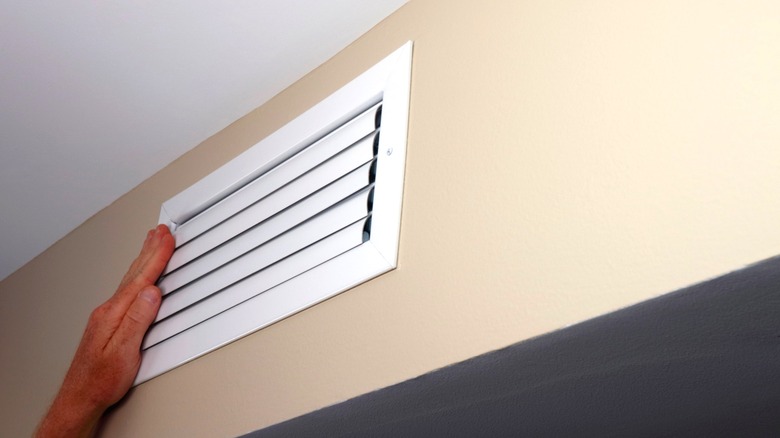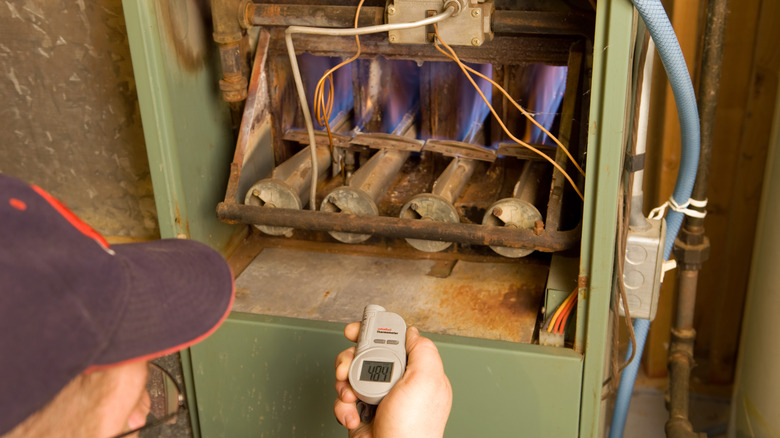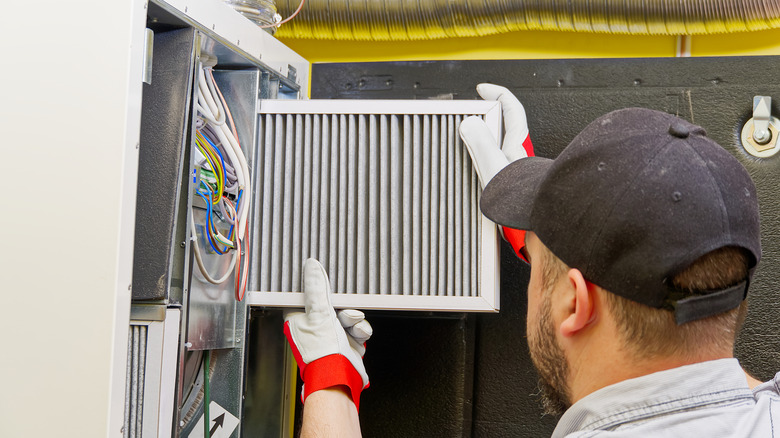Think Twice Before Closing Off Vents In The Winter
Energy costs are projected to soar this year, with the National Energy Assistance Directors Association (NEADA) reporting that the average cost to heat a home will increase by about 10.5% this winter. The impending rise in spending will have a lot of households wondering how to reduce their energy costs at home. While brainstorming energy-saving ideas, you might wonder if closing vents in unused rooms in winter will help you spend less on heating. At first glance, it makes sense — closed vents will redirect the hot air to spaces that need it most, letting you stay warm without wasting energy on rooms you don't use. But as sensical as it may sound, you should think twice before closing off your vents in the winter, as doing so can increase your energy consumption, make your HVAC work harder under unnecessary pressure, and cause health issues.
To understand why closing your vents is an all-around bad idea for energy efficiency, you have to consider how a heating and cooling system functions. Your HVAC adjusts its output based on the set points you've made and the actual temperature in the room with the thermostat. When you close vents in underused spaces, you cause these rooms to get colder. Since heat moves from warm to cold areas, these cold rooms will "steal" warmth from elsewhere in the house and gradually reduce the overall home temperatures. As the temps next to the thermostat drop, the heating system will increase its workload to generate more heat. Therefore, when you close the vents, not only do you not save money, but you might actually drive up the heating costs.
Closing vents can harm your HVAC system and your health
When you close vents in underused spaces, the increased pressure in your air ducts can reduce the HVAC system's lifespan. First, the furnace will suffer from stress-related wear, as it continuously runs to meet your home's temperature demands. Also, the closed vents raise the pressure inside the ducts, and this excess pressure causes the system's blower to operate under greater stress — this also leads to premature wear and eventual failure.
If you close a room's return vents, you'll reduce the amount of air flowing back to the furnace and starve the heat exchanger of the return air it needs to operate safely and keep itself from overheating. This is a significant issue that can lead to high replacement costs and create an imminent threat to your life and wellbeing. A heat exchanger transfers heat from the burner to the air moving through your HVAC system. When overworked or overheated, it can malfunction or even crack. A cracked heat exchanger in a gas furnace may release high levels of carbon monoxide (CO) into your home. You might be unaware of the gas's presence, since CO is odorless and can often go undetected. Exposure to carbon monoxide can result in dizziness, loss of consciousness, memory problems, and, in severe cases, death.
Closing your HVAC vents can result in other, less serious health issues. Restricting air flow through the vents can cause condensation within your ducts, creating the perfect breeding environment for mold and mildew. If mold develops in your vents, you can experience significant health problems, including respiratory issues and allergies.
How to improve home energy efficiency during the heating season
The good news is that while you should avoid fully closing your vents, you can partially close them without issues when prepping your furnace for the winter. When the vents are halfway open, you still get sufficient airflow without causing pressure buildup in the ducts. Plus, you can enjoy reduced energy costs.
Another way to reduce energy spending is to ensure regular HVAC system maintenance. A properly serviced furnace will operate at its peak efficiency. One of the easiest ways to maintain your system is to change the filter every three months, so air can flow freely. Also, consider investing in an annual HVAC maintenance checkup to see if everything's in working order. A skilled technician can observe whether there's anything amiss in your system and address any problems before they worsen.
Apart from keeping an eye on your HVAC system's health, one of the easiest ways to save cash on your heating costs (one you may not know about) is to keep your curtains open. By allowing sunlight to filter into the home, you naturally heat the space. This way, your thermostat can stay at a lower temperature and the HVAC system can burn less fuel.


